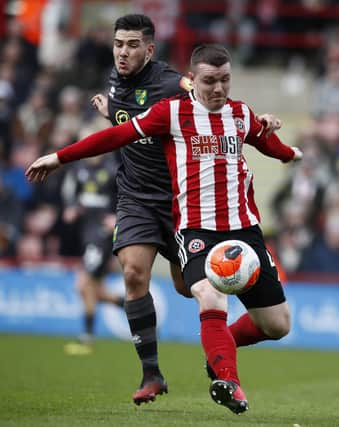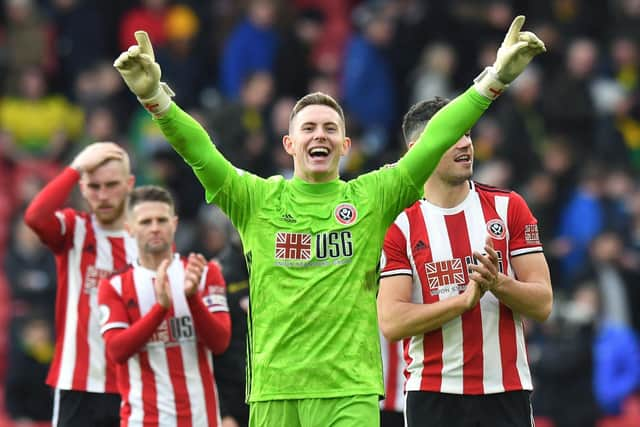Sheffield United itching to kick on and prove they are no flash in the pan


Even taking into account how under-rated their manager was after dragging himself, promotion by promotion, from non-league football to the Premier League, it was not being cruel to suggest finishing 17th would have been a good achievement in 2019-20. When football came to a halt for the coronavirus, the Blades were seventh, with a game in hand to go higher.
Recent history has shown staying up is perfectly achievable for a newly-promoted team with a good method, and the Blades have refined theirs all the way from League One. Three at the back with overlapping centre-backs got them this far, and rather than start again, they simply added quality and depth in the summer. But a top-half finish? A first European qualification? That was another thing altogether.
Advertisement
Hide AdAdvertisement
Hide AdEchoing Huddersfield Town’s top-flight arrival, the Blades broke their transfer record four times in the summer, yet most of their improvement came from within.


Lys Mousset only found his feet in late October, Oli McBurnie really in January. Callum Robinson was bought for the future, Ravel Morrison a free transfer gamble that did not come off. Mo Besic, Luke Freeman, Ben Osborn, Michael Verrips and Phil Jagielka have been fringe players, the latter bringing much off the field.
The players who got the Blades back to the ‘Promised Land’ after 12 years away were given the chance to enjoy the spoils.
A tweak from 3-4-1-2 to 3-5-2 was pragmatic without being negative. It asked John Fleck to run more from midfield, and opened the door to John Lundstram, peripheral the previous season. If spending £22m on Sander Berge was a discouragement, he has responded as Chris Wilder hoped, upping his game again.
Advertisement
Hide AdAdvertisement
Hide AdGetting wide to deliver crosses and into the area to convert them, Fleck and Lundstram have been outstanding this season, and fundamental to the Blades.
When coronavirus struck, Dean Henderson was arguably England’s best goalkeeper. His heroics to deny Norwich City were a great sign-off and it would have been interesting to see if he could have usurped Jordan Pickford as England’s No 1 this summer.
The back three of Chris Basham, John Egan and Jack O’Connell showed they had Premier League class as success was built on solid foundations, but the adventure of wing-backs George Baldock and Enda Stevens has been undimmed, never better showcased than at Carrow Road.
Oliver Norwood controlled affairs in the way modern holding midfielders should, and centre-forward David McGoldrick produced performances and a work-rate which belied his lack of goals.
Advertisement
Hide AdAdvertisement
Hide AdA side reared on 46-game seasons got used to largely playing weekend to weekend, but found top-division intensity.
Billy Sharp’s 88th-minute equaliser at Bournemouth was a great start, followed by victory at home to Crystal Palace. The Blades came from 2-0 down to draw 2-2 at Chelsea. Spirit was never likely to be an issue.
They showed mental toughness, too. They failed to become the first team to take a point off Liverpool only because of an error by Henderson. When Wilder pointed it out, some gasped in horror. You cannot say things like that about modern Premier League footballers. You can when they have Henderson’s mental toughness. He just got better.
October’s visit by Arsenal felt like a watershed. The Liverpool game had been typical of those at Bramall Lane thus far, the football better than the result. Arsenal were despatched 1-0, Burnley blown away, then Manchester United showed the Blades the respect of matching defensive formations and proved they were not as good at three-at-the-back as their hosts. Ten minutes from their outstanding attackers put them 3-2 up, only for McBurnie’s late equaliser.
Advertisement
Hide AdAdvertisement
Hide AdAs the Blades looked down on Ole Gunnar Solskajer’s men – and Arsenal and Tottenham Hotspur – in late November, people began to realise this was no flash in the plan. Only horrendous luck with the video assistant referee, most ludicrously sparing Mauricio Pochettino defeat in his final Spurs game, cost them more points.
The strikers took it in turns to hit form, Mousset in the autumn, then Sharp and McBurnie. The £22m club record signing of Berge was a sign of confidence in a boardroom where ownership squabbles which went all the way to the High Court had no impact on the pitch. The Norwegian is yet to settle, but with no relegation battle, has the luxury of time.
New contracts for Wilder, assistant Alan Knill, Fleck and Stevens, were a sign the Blades were not getting ahead of themselves, a planned upgrade of the academy was long-term thinking.
When life went on hold, the Blades were a home FA Cup tie from Wembley and in what should be a Europa League place. With Chelsea, Wolverhampton Wanderers, Everton and Tottenham to come at home and Manchester United away, the Champions League is in sight if the Blades can play those games as intended.
Advertisement
Hide AdAdvertisement
Hide AdTo feature in the elite competition would be ridiculous, and the extra demands of any European football would ask a lot of a squad in only its second Premier League season but 2019-20 has already taught us never to rule anything out with this Sheffield United side and never, ever under-estimate them.